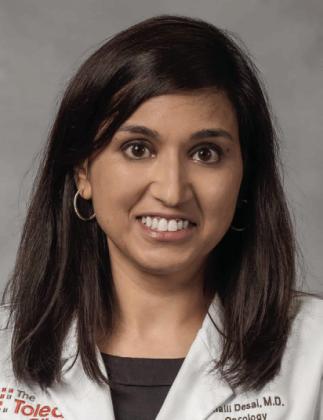Most people are aware that regular exercise improves cardiovascular health, assists in maintaining an appropriate body weight, strengthens muscles and bones, and boosts emotional well-being. Perhaps somewhat less well known is the fact that, in addition to these and many other health benefits, exercise can also play an important role in cancer prevention.
According to Shaili Desai, MD, of The Toledo Clinic Cancer Centers, multiple studies show that regular physical activity can protect against several so-called solid-organ cancers, such as breast, bladder, colorectal, gastroesophageal, and pancreatic cancers. “Getting 30 to 60 minutes per day of aerobic/cardiovascular activity has been shown to reduce the risk of developing cancer, especially breast and colon cancers. A moderate level of exertion, such as brisk walking or bicycling, is all that’s necessary to get this benefit. You don’t have to do a high-intensity workout,” she says.
How exactly does regular physical activity help prevent cancer? Several mechanisms may be involved. For example, exercise increases circulation, improves immune function, reduces inflammation, accelerates the rate at which food travels through the digestive system (thus limiting exposure of the gastrointestinal tract to potential carcinogens), and helps prevent obesity— all factors related to cancer risk. “Also, different studies have revealed that getting more exercise reduces the levels of certain growth factors, such as insulin, as well as various sex-driven hormones that are known to ramp up the growth and spread of tumors,” Dr. Desai adds.
Not only does exercise help prevent the development of cancer, but it can also be a powerful ally in fighting the disease for those who have already been diagnosed. Dr. Desai notes that one way exercise can be of tremendous benefit to cancer patients after diagnosis is in making chemotherapy treatments more tolerable. “Patients who are undergoing chemotherapy— and who have no contraindications to physical activity—experience significantly less fatigue and feel better and more energized when they get an average of 150 minutes of exercise per week. Again, it doesn’t need to be high-intensity exercise. As a result, they’re less likely to need dose reductions or treatment delays, ensuring that chemotherapy treatments are as effective as possible,” she says. Dr. Desai also points out that studies have shown a reduced risk of recurrence of breast and colon cancers in patients who average 150 minutes of moderate-intensity exercise each week. She adds, “Breast and colon cancers are just the most studied cancers in this regard. It’s likely that all cancer types will benefit, especially from any form of exercise that leads to an ideal body weight and prevents obesity.”
Dr. Desai’s best advice for HLN readers with respect to exercise and cancer prevention is, “Get up and get moving! Find an activity you enjoy and make it your goal to do it every day for 30 to 60 minutes. Keep in mind that it doesn’t have to be a high-intensity exercise to get all the benefits.”
The Toledo Clinic Cancer Centers, located at 1200 Medical Center Parkway in Maumee and 4126 N. Holland Sylvania Road, Suite 105 in Toledo, also provides imaging, laboratory, chemotherapy, specialized pharmacy, and IV services. The cancer center consists of 13 physicians and 11 advanced practice providers. The cancer center also has satellite centers in Napoleon, Bowling Green, Wauseon, Bellevue, and Monroe.
The Toledo Clinic Cancer Centers has earned Patient-Centered Specialty Practice recognition and Oncology Medical Home recognition from the National Committee for Quality Assurance. Oncology homes align systems and resources with coordinated care focused on cancer patients and their needs. This reduces fragmentation, supports shared decision making, and improves the patient experience. They are the first oncology practice in the state of Michigan and the second oncology practice in the state of Ohio to receive this recognition.
For more information, please call The Toledo Clinic Cancer Centers at 419-479-5605. ✲


